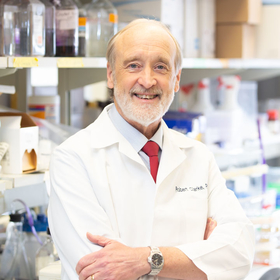

801 16th Ave NE
Austin, MN 55912
United States
United States
Robert
Clarke
We collect multiplatform (including genomic, transcriptomic, proteomic, metabolomic) data from human breast cancer cell lines, animal models and patients. Analyze these data using machine learning and artificial intelligence based algorithms to build predictive models of drug resistance. Finally, we validate model predictions mechanistically in experimental in vitro and in vivo models.
Research statement
Dr. Clarke’s research is involved in mechanistic translational and transdisciplinary studies in breast cancer, with an emphasis on endocrine responsiveness and drug resistance. Focusing initially on the interactions of hormones and cytotoxic drugs in breast cancer cells, research expanded into studies of the cellular and molecular mechanisms of how breast cancers become resistant to endocrine and cytotoxic therapies. Dr. Clarke’s laboratory takes a systems biology approach, applying state-of-the-art ‘omics’ (genomic, transcriptomic, proteomic, metabolomic), bioinformatic, cellular and molecular biologic technologies to cell cultures, animal models, and human specimens from clinical studies. A long time collaboration with computer scientists and engineers has enabled much of this work
Selected publications
Chen, X., Gu, J., Neuwald, A.F., Hilakivi-Clarke, L.A., Clarke, R. & Xuan, J. “Identifying intracellular signaling modules and exploring pathways associated with breast cancer recurrence.” Sci Rep 11: 385. doi: 10.1038/s41598-020-79603-5, 2021.
Fan, M., Xia, P., Clarke, R., Wang, Y. & Li, L. “Radiogenomic signatures reveal multiscale intratumour heterogeneity associated with biological functions and survival in breast cancer.” Nature Commun, 11:4861 doi 10.1038/s41467-020-18703-2, 2020.
Remoli, A.L., Sgarbanti, M., Perrotti, E., Acchioni, M., Orsatti, R., Acchioni, B., Clarke, R. & Marsili, G. “IĸB kinase-ε-mediated phosphorylation triggers IRF-1 degradation in breast cancer cells.” Neoplasia, 22: 459-469, 2020
Sengupta, S. Sevigny, C., Jordan, V.C. & Clarke, R. “Estrogen induced apoptosis in breast cancers is phenocopied by blocking de-phosphorylation of eIF2-alpha protein.” Mol Cancer Res, 17: 918-928, 2019.
Hilakivi-Clarke, L.A., Wärri, A., Bouker, K.B., Zhang, X., Cook, K.L., Jin, L., Zwart, A., Nguyen, N., Hu, R., Cruz, I.M., de Assis, S., Wang, X., Xuan, J., Wang, Y., Wehrenberg, B. & Clarke R. “In utero exposure to ethinyl estradiol predisposes to tamoxifen resistance and breast cancer recurrence in a preclinical model.” J Natl Cancer Inst, doi: 10.1093/jnci/djw188, 2017.
Cook, K.L., Soto-Pantoja, D.R., Clarke, P.A.G., Cruz, I., Zwart, A., Wärri, A., Roberts, D.D., & Clarke, R. “Endoplasmic reticulum stress protein, GRP78, modulates lipid metabolism to control breast tumor drug sensitivity and activate anti-tumor immunity.” Cancer Res, 76:5657-5670, 2016.
Hu, R., Wärri, A., Jin, L., Zwart, A., Riggins, R.B. & Clarke, R. “NFκB signaling is required for XBP1 (U and S) mediated effects on antiestrogen responsiveness and cell fate decisions in breast cancer cells.” Mol Cell Biol, 35: 379-390, 2015.
Education and background
- 1980 BSc Biological Science, University of Ulster, Northern Ireland, UK
- 1982 MSc Biochemistry, Queen's University of Belfast, Northern Ireland, UK
- 1986 PhD Biochemistry, Queen's University of Belfast, Northern Ireland, UK
- 1988 Postdoc, National Cancer Institute, NIH, Bethesda, MD, USA
- 1999 DSc Biochemistry. Queen's University of Belfast, Northern Ireland, UK
- Fellow, American Association for the Advancement of Science (AAAS)
- Fellow, Royal Society of Chemistry (UK)
- Fellow, Royal Society of Biology (UK)
- Fellow, Royal Society of Medicine (UK)